hankyoreh
Links to other country sites 다른 나라 사이트 링크
Angolan family stuck in Incheon Airport for six month as they seek refugee status
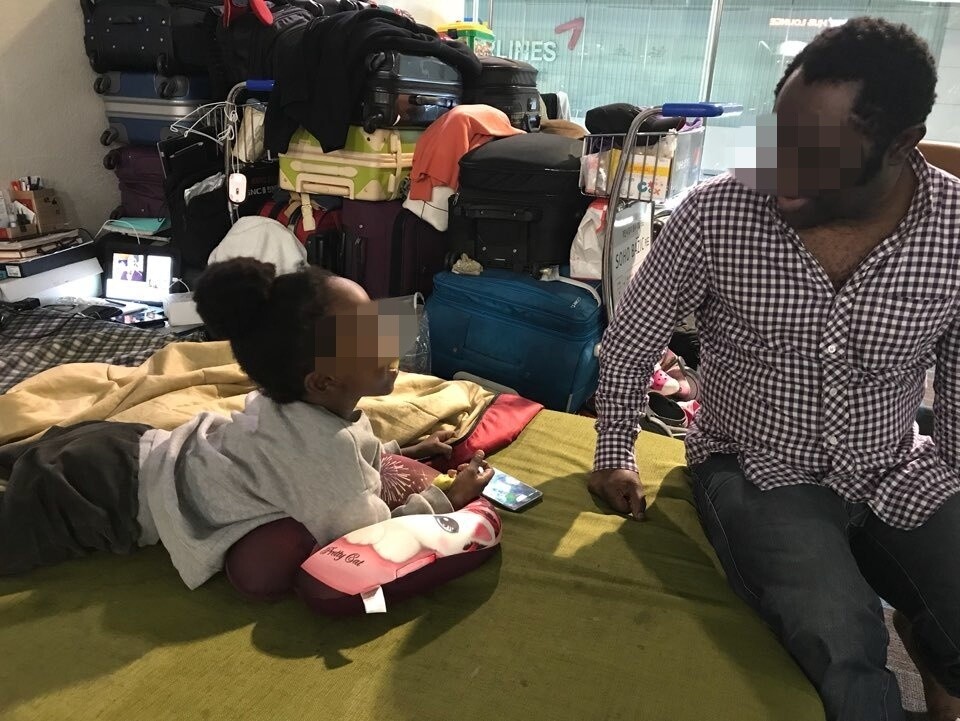
Nkuka Lulendo and his family are Angolan nationals from a Congolese background. Amid widespread discrimination and suppression of Congolese residents by the Angolan ruling class as a result of frequent wars, the Lulendo family also suffered persecution, including illegal detention by the Angolan police. Police tortured Lulendo and sexually assaulted his wife. According to UN statistics, some 330,000 Congolese were driven out of Angola in the month of October 2018. Lulendo and his family decided to come to South Korea and seek refugee status. Receiving tourism visas in Angola, they arrived at Incheon Airport on Dec. 28 of last year. But Lulendo, his wife, and their four children were denied entry at the airport and had their passports confiscated.
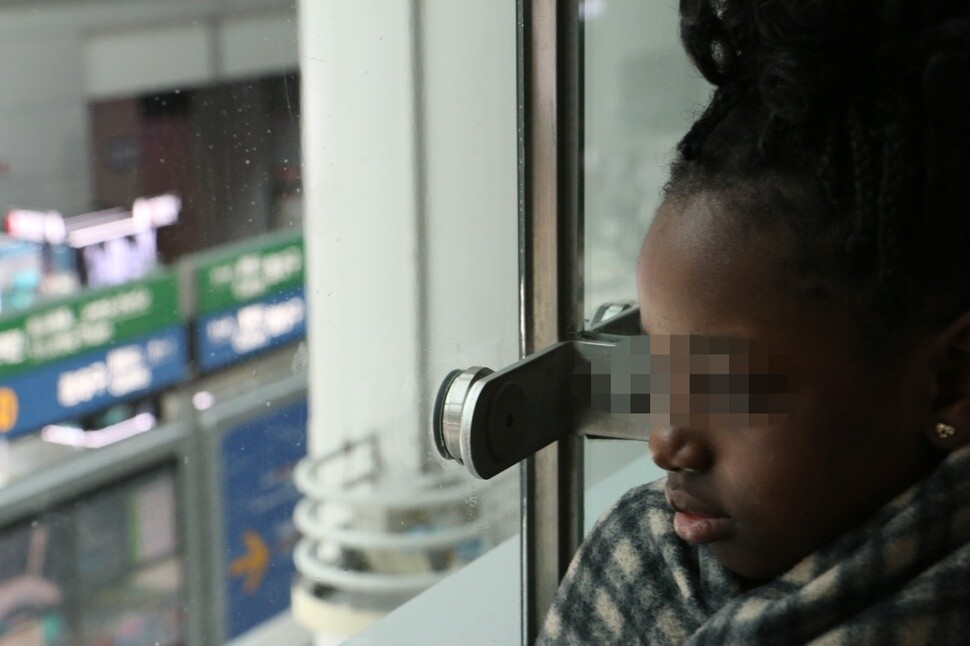
On Jan. 9, the Lulendos underwent a refugee status recognition referral review to determine whether they were qualified to apply for refugee status. They were subsequently notified that the referral had been denied. The Incheon Airport Office of Immigration had determined that the family’s case constituted a “clear absence of grounds for applying for refugee status, including a possible attempt to gain refugee status for purely economic reasons.” Based on that decision, the Lulendos were unable to even apply for refugee status recognition. In cases where Incheon Airport does not refer a person for refugee reviews, the person is typically deported back home within seven days. Those who file an administrative suit within the time period are entitled to live at the airport while the suit is going on. Concluding that they might be killed if deported to Angola, Lulendo and his family refused repatriation and filed suit to have their referral denial overturned. On Apr. 25, they lost that case as well. As of June 20, the family had been residing for six months in the transfer lounge within the Incheon Airport duty-free section as they awaited their appeal.
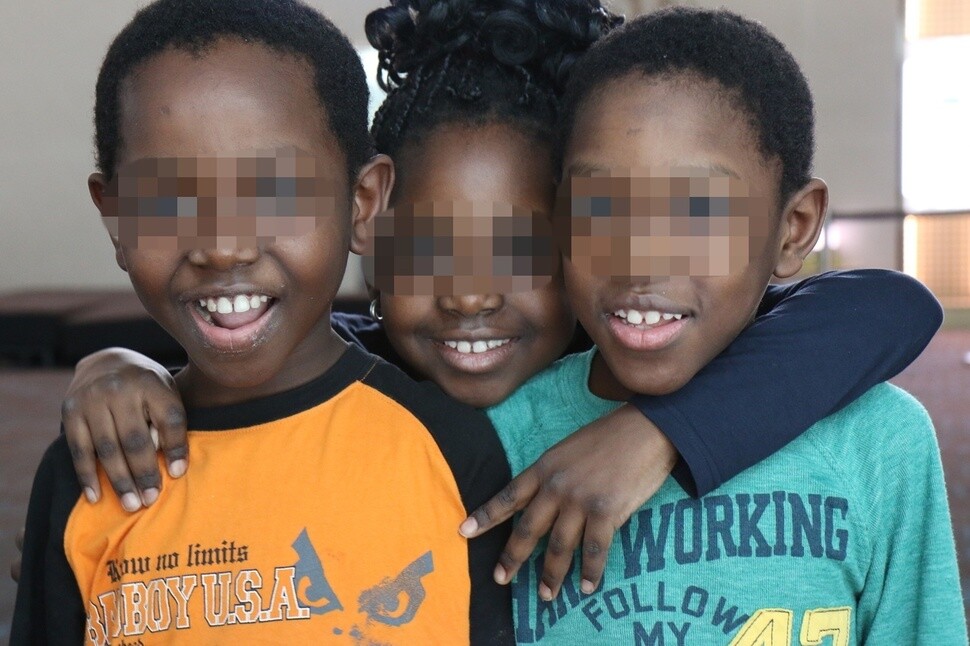
How is the family holding up now? Choi Yoon-do, chief editor of Duri Media, entered the duty-free section several times to speak with the Lulendos.
“I met with them five or six times between March and the end of last month. Each time I saw them, they were in worse shape,” Choi said.
“They are just surviving on food and daily essentials given to them by departing passengers,” he explained. Passengers are recruited on Facebook and elsewhere by the group “Supporters of the Lulendo Family” and given items to pass along to the family.
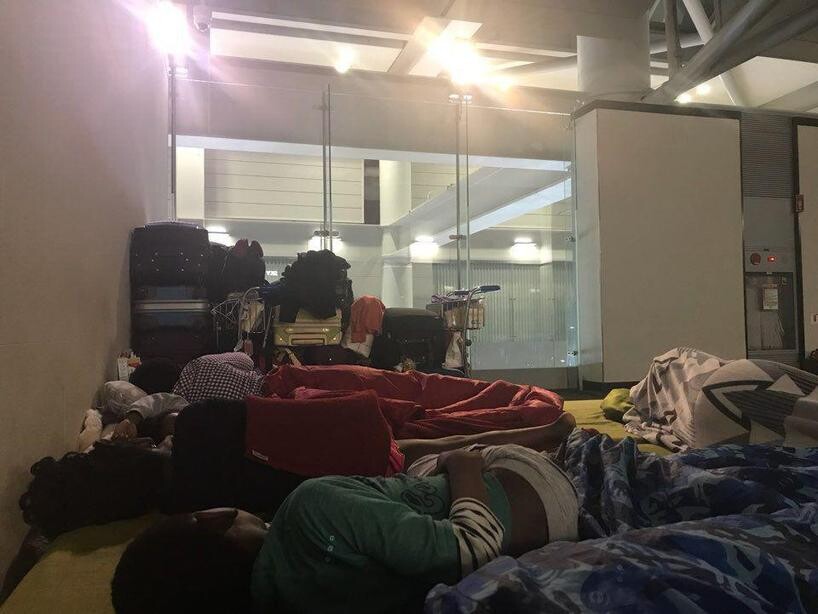
Photographs and video footage taken by Choi show the family to be living on a sofa at one end of the corridor. The four children, all of them under 10 years old, are unable to go to sleep even after two in the morning because the bright lights, dry air, dust, and noise.
“Some people harass the children,” said Choi, whom the Lulendo children refer to as “uncle.”
“So every time I visit, the children plead with me to go with them to the bathroom. It’s exasperating that there isn’t any good solution,” he sighed.
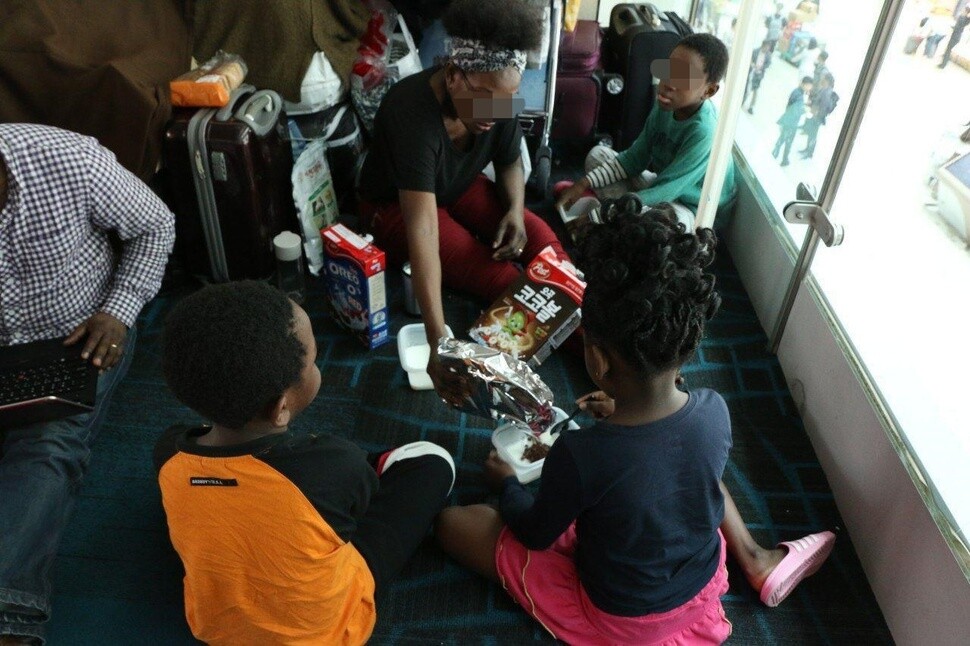
According to Choi, the family’s health is the most urgent concern.
“I went to see the family in late May, and the second child had a stomachache and couldn’t eat. Mr. and Mrs. Lulendo just watched helplessly, not knowing what to do,” he said.
“It was so upsetting that I called the Incheon Airport emergency team and got an emergency landing permit so the child could go to the hospital,” he explained.
On June 20, the group With Refugees Joint Action held a press conference in front of the Ministry of Justice Immigration Service Center at Incheon Airport.
“This place, which boasts the world’s number one ranked scale and facilities, is becoming a prison and a hell for many refugees,” the group said.
“The refugees detained at the airport need to be able to find freedom so they can live with us as neighbors,” they urged.
S. Korea accepts only 3.7% of refugee applicants
According to 2018 refugee application and processing figures announced by the Ministry of Justice the same day, a total of 16,173 foreign nationals requested refugee status recognition by South Korea last year – the largest number since applications were first accepted in 1994. Reviews were completed in 2018 for 3,879 people, out of whom only 144 – or 3.7% – were recognized as refugees. The average rate of refugee status recognition worldwide is 29.8%; for the OECD, the rate is 24.8%. Another 514 people were granted permits for humanitarian sojourns.
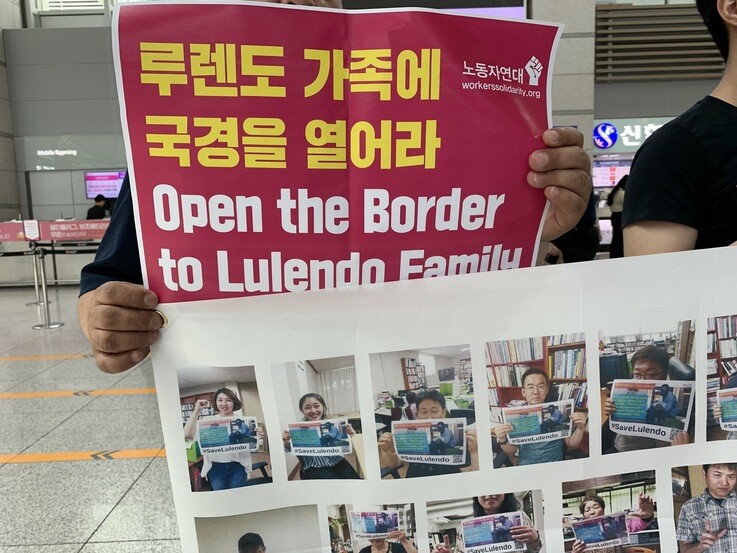
In a press conference statement, the group said, “Mr. and Mrs. Lulendo’s health is in a very serious state. Their four children, who are all less than 10 years old, have not received an adequate education for half a year despite being at an age when they require sufficient nutrition and care.”
“Even after ratifying the UN Convention on the Rights of the Child, the Republic of Korea has not taken even minimal measures for children’s rights,” they said. The Lulendo family’s appeal hearing is scheduled to take place in July.
By Yi Ju-been, staff reporter
Please direct comments or questions to [english@hani.co.kr]

Editorial・opinion
![[Editorial] Does Yoon think the Korean public is wrong? [Editorial] Does Yoon think the Korean public is wrong?](https://flexible.img.hani.co.kr/flexible/normal/500/300/imgdb/original/2024/0417/8517133419684774.jpg) [Editorial] Does Yoon think the Korean public is wrong?
[Editorial] Does Yoon think the Korean public is wrong?![[Editorial] As it bolsters its alliance with US, Japan must be accountable for past [Editorial] As it bolsters its alliance with US, Japan must be accountable for past](https://flexible.img.hani.co.kr/flexible/normal/500/300/imgdb/original/2024/0417/6817133413968321.jpg) [Editorial] As it bolsters its alliance with US, Japan must be accountable for past
[Editorial] As it bolsters its alliance with US, Japan must be accountable for past- [Guest essay] Amending the Constitution is Yoon’s key to leaving office in public’s good graces
- [Editorial] 10 years on, lessons of Sewol tragedy must never be forgotten
- [Column] A death blow to Korea’s prosecutor politics
- [Correspondent’s column] The US and the end of Japanese pacifism
- [Guest essay] How Korea turned its trainee doctors into monsters
- [Guest essay] As someone who helped forge Seoul-Moscow ties, their status today troubles me
- [Editorial] Koreans sent a loud and clear message to Yoon
- [Column] In Korea’s midterm elections, it’s time for accountability
Most viewed articles
- 1‘Right direction’: After judgment day from voters, Yoon shrugs off calls for change
- 2[Editorial] Does Yoon think the Korean public is wrong?
- 3Where Sewol sank 10 years ago, a sea of tears as parents mourn lost children
- 4Strong dollar isn’t all that’s pushing won exchange rate into to 1,400 range
- 5[Editorial] As it bolsters its alliance with US, Japan must be accountable for past
- 6Japan officially says compensation of Korean forced laborers isn’t its responsibility
- 7Korea ranks among 10 countries going backward on coal power, report shows
- 8Faith in the power of memory: Why these teens carry yellow ribbons for Sewol
- 9US, Japan and China move to become self-sufficient in semiconductors
- 10[News analysis] Watershed augmentation of US-Japan alliance to put Korea’s diplomacy to the test